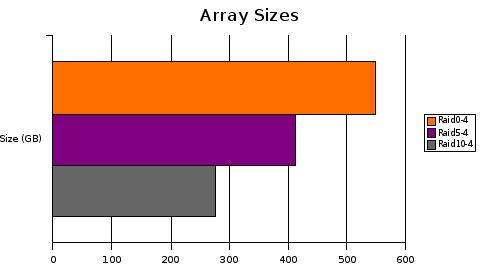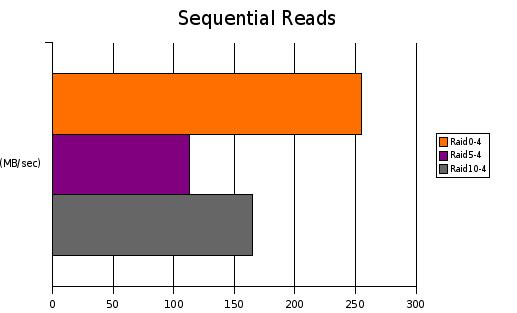Adaptec RAID 3805 8-port SATA and SAS Controller Review
Conclusions
These days are two typical reasons for utilizing raid – Performance and Reliability. Years back space was a concern however hard drives approaching 1TB in size, this is no longer an issue except in extreme cases. While some of the tests used configurations that are financially out of reach for most of us, it was still neat to see 8 drive configurations to see just what we are missing. What’s tough to swallow for consumers is the cost at building such a powerful array. The 3805 can be found for $487 (with cables) while the smaller 4 port version (3405) can be picked up for as cheap as $332 with cables. Bumping up the 3805 to 256MB will run you about $35. This might be a good choice if your array will have a lot of access but is really not necessary for most users. So using a couple low cost drive configurations:
|
3805 (8 Port 128MB w/ Cables) |
3405 (4 Port 128MB w/ Cables |
|
$487 |
$332 |
|
4x SV35 Barracudas ($75 each) |
4x SV35 Barracudas ($75 each) |
|
= $787 |
= $632 |
The above configurations are an excellent choice for both gamers and multimedia enthusiasts. The cost is a little high, but so are the performance and data integrity. Setting these up in Raid5 would yield a nice little 700GB partition. If you get the 8 port model you can pick up an extra drive as a hot spare. Adaptec as well as many raid card manufacturer strongly recommend that you choose drives of the same make and model when mounted in the same case. Vibrations caused by varying spindle types can cause drive failures ( I know � ).
To simplify our benchmarks, here is are a couple graphs that show only 4 drive configurations. On both servers and desktops most IO operations are sequential reads. So you should probably focus reading and seeks more than writing.


Raid0 definitely has its speed benefits in nearly all cases. However the likely hood for failure is dramatically increased. If you like most of us and are a gamer, a separate raid0 array from your boot solution. Setting up a task in your operating system to copy important files between the two can work very well. This way you can get away with 3 drives.
Raid10 can be a good compromise between raid5 and raid0 in terms of size. This configuration also allows you to have 1 and sometimes two drives fail and still maintain your volume. If you are like me and use your PC as a DVR, I have no real need for the extra speed. Raid5 is my choice because it gives me the most hard drive space while giving me at least one drive failure. If a drive does fail getting a next day air replacement from newegg will suffice. The odds that another drive will fail in those 24 hours are extremely low. If I want to be even more cautious, I can keep a hot spare in the array that could be merged into the array automatically.
You should also configure windows or linux to set your swap file on the raid array rather than your single disk. If you are not in the 4GB club, this is a very good idea as it will have a significant impact on your system performance if you do start swapping. Windows XP and possibly Vista may swap regardless if you need it or not. There are registry hacks available to tweak the internal virtual memory usage. Linux on the other hand will not and usually uses a dedicated swap partition which removes the filesystem as a potential bottleneck.
If there was a part two to this review, I would likely include tests of 7200rpm SATA drives which are bigger and cheaper. Setting up a 4 drive array with 150GB Raptors would easily approach $1000. If you are financially blessed, 15k rpm SAS drives would be the ultimate. Gaging power consumption verses a single or array configuration on a mainboard could be interesting. According to adaptec this card consumes ~3.3 Watts when in “operation”. This is hardly noticeable in the grand scheme of things, but the card’s heatsink gives off a fair amount of heat so make sure you case has good airflow for the card and drives.
Legit Bottom Line: If you are serious about both data integrity and brute speed, get a hardware sata controller. This particular line of cards from adaptec is an excellent choice in terms of performance and price. The card is compact, very usable and comes with a great toolset for windows, linux, solaris and even some *BSDs. If you have the cash, you will not be disappointed.

Comments are closed.